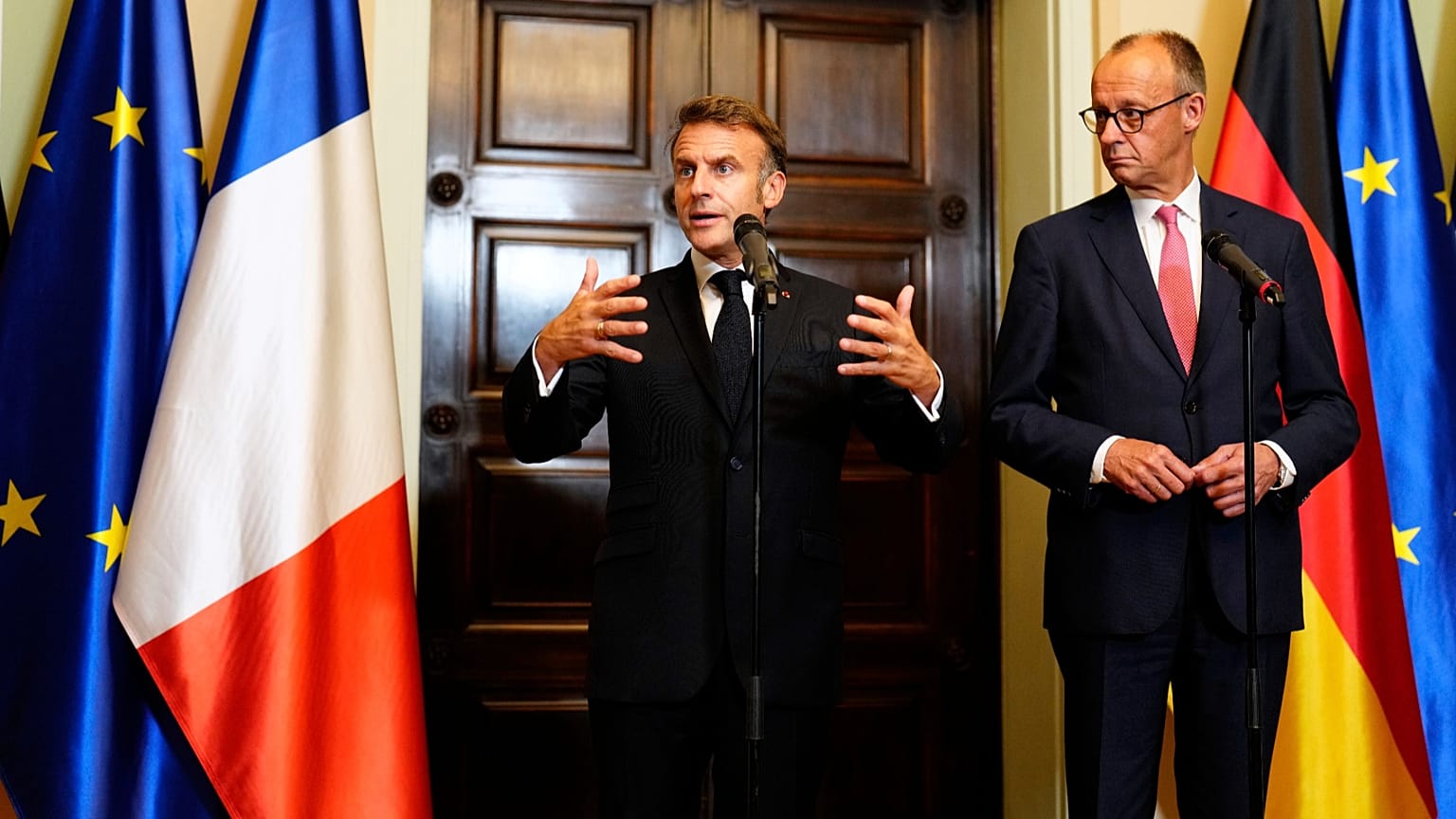Top Stories
France and Germany Explore ‘Best Athlete’ Model for EU Defense

France and Germany are initiating discussions on a controversial proposal to enhance European defense production by adopting a so-called “best athlete” model. This approach aims to streamline military production across the European Union (EU) amid concerns over fragmentation and inefficiencies within the defense sector. The talks, scheduled for October 6, 2023, will involve French President Emmanuel Macron and German Chancellor Friedrich Merz, along with their respective foreign and defense ministers.
The EU’s defense initiatives have historically been hampered by member states prioritizing their domestic industries, citing national security needs. This fragmentation has created challenges for countries like Ukraine, which must navigate an array of different weapon systems from various European nations, complicating logistics and operational efficiency. Currently, Europe employs multiple fighter jet types, including the Eurofighter Typhoon, Rafale, JAS Gripen, and the American-made F-35.
Evaluating the ‘Best Athlete’ Concept
During their upcoming meeting, Macron and Merz will discuss the feasibility of establishing a “best athlete” system, a concept aimed at concentrating production capabilities on the most advanced and effective military systems. According to officials from the French presidential palace, this model seeks to reduce the number of different weapons systems within the EU, thus streamlining procurement and enhancing interoperability.
Significant funding is projected for the defense sector, with estimates suggesting that hundreds of billions of euros will be invested by 2030. This financial influx is expected to support initiatives that encourage collaborative procurement strategies, ultimately aiming to lower costs while boosting the European manufacturing base.
Despite its potential advantages, the “best athlete” model has sparked concerns among some EU leaders. Critics argue that it may disproportionately benefit larger defense firms, particularly those in France and Germany, while sidelining smaller, domestic producers. Observers note that Macron’s previous advocacy for a European preference in defense procurement has already generated apprehension among other EU nations, particularly regarding possible repercussions from the United States.
Pros and Challenges of a Unified Defense Strategy
Ester Sabatino, a research associate for Defense and Military Analysis at the International Institute for Strategic Studies (IISS), suggests that adopting a “best athlete” model could be a “sensible decision.” She argues that leading defense companies are often better equipped to meet demand due to their efficient development and production cycles. Nonetheless, she cautions that a reduction in the variety of military equipment could lead to fewer industrial options and diminished competition, potentially stifling innovation.
Furthermore, the model may face resistance from capitals such as Warsaw, which are keen on developing their national defense industries. Poland has been actively purchasing military equipment from the United States and South Korea, recently announcing a deal for an additional 180 tanks valued at over €6 billion.
The discussions between France and Germany will also cover joint defense projects, including the Future Combat Air System (FCAS) and the Main Ground Combat System (MGCS). However, the FCAS project is currently embroiled in disputes, particularly concerning the workshare distribution demanded by France’s Dassault Aviation, which seeks to secure 80% of the project.
Jacob Ross, a research fellow at the German Council on Foreign Relations, highlighted the intricate dynamics at play, stating that significant pressure exists on both leaders to resolve ongoing conflicts related to the FCAS. Failure to advance this project could jeopardize Franco-German leadership in European defense cooperation.
As the discussions unfold, it remains uncertain whether France and Germany can create a unified stance that resonates with other EU member states regarding the “best athlete” model. Current disparities in national defense strategies, particularly Germany’s reliance on American equipment for capabilities it does not produce domestically, complicate these negotiations.
The Elysee Palace has emphasized that developing a coherent defense policy will require “extremely complex work.” Ultimately, the key challenge will be to reduce the diversity of weapon systems in Europe while ensuring that production remains robust and sovereign.
-

 Top Stories3 months ago
Top Stories3 months agoTributes Surge for 9-Year-Old Leon Briody After Cancer Battle
-

 Entertainment4 months ago
Entertainment4 months agoAimee Osbourne Joins Family for Emotional Tribute to Ozzy
-

 Politics4 months ago
Politics4 months agoDanny Healy-Rae Considers Complaint After Altercation with Garda
-

 Top Stories4 months ago
Top Stories4 months agoIreland Enjoys Summer Heat as Hurricane Erin Approaches Atlantic
-

 World5 months ago
World5 months agoHawaii Commemorates 80 Years Since Hiroshima Bombing with Ceremony
-

 Top Stories3 months ago
Top Stories3 months agoNewcastle West Woman Patricia Foley Found Safe After Urgent Search
-

 Top Stories5 months ago
Top Stories5 months agoFianna Fáil TDs Urgently Consider Maire Geoghegan-Quinn for Presidency
-

 World5 months ago
World5 months agoCouple Convicted of Murdering Two-Year-Old Grandson in Wales
-

 World5 months ago
World5 months agoGaza Aid Distribution Tragedy: 20 Killed Amid Ongoing Violence
-

 World5 months ago
World5 months agoAristocrat Constance Marten and Partner Convicted of Infant Murder
-

 Top Stories4 months ago
Top Stories4 months agoClimbing Errigal: A Must-Do Summer Adventure in Donegal
-

 Top Stories4 months ago
Top Stories4 months agoHike Donegal’s Errigal Mountain NOW for Unforgettable Summer Views









